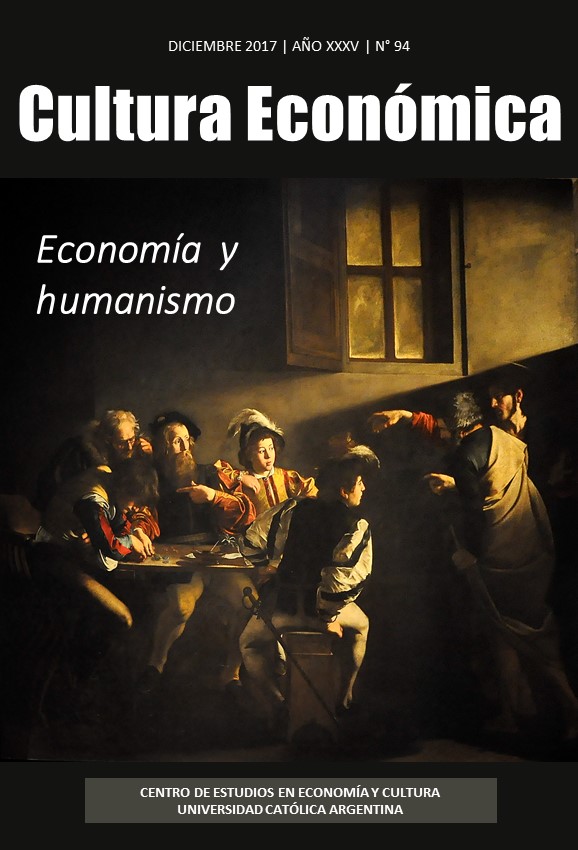El principio del resultado y la crisis de la ciencia económica moderna
Palabras clave:
ANTROPOLOGÍA, UTILITARISMO, ECONOMÍA DEL DON, LEONARDO POLOResumen
Se propone una lectura antropológica de la génesis e itinerario de la ciencia económica moderna en orden a comprender su situación contemporánea de crisis. La pretensión de garantías y resultados ante la incertidumbre de la actividad económica por ser una ciencia humana condujo al hombre moderno a reestructurar las claves de su actuar. Se trata en definitiva de un reduccionismo antropológico que abandona el crecimiento humano como eje central en orden a la adquisición de resultados que abre paso al utilitarismo materialista. En este trabajo se abordan seis claves del principio rector de la ciencia moderna y su vertiente económica.Descargas
Citas
Aristóteles (2008). Metafísica. Alianza, Madrid.
Aristóteles (1992). Ética Nicomáquea. Porrúa, México.
Benedicto XVI (2006). Discurso del Santo Padre en la Universidad de Ratisbona.https://w2.vatican.va/content/benedict-xvi/es/speeches/
/september/documents/hf_ben-xvi_spe20060912_university-regensburg.html
Francisco I (2013). “Discurso del Santo Padre Francisco a los Embajadores de Kirguistán, Antigua y Barbuda, Luxemburgo y Botswana”.https://w2.vatican.va/content/francesco/es/speeches/2013/may/documents/papa-francesco_20130516_nuovi-ambasciatori.html
Gillespie, M. A. (1995). Nihilism Before Nietzsche. University of Chicago Press, Chicago.
Gilson, E. (1955). History of Christian Philosophy in the Middle Ages. Random House, New York.
Hume, D. ([1748] 2004). Investigación sobre el entendimiento humano. Losada, Buenos Aires.
Inciarte, F. (2005). First Principles, substance and action. Studies in Aristotle and Aristotelianism. Olms, Hildesheim.
Juan Pablo II (1991). Carta Enclíclica Centesimus annus.
Kant, I. (2004). Prolegómenos a toda metafísica futura. Gredos, Madrid.
Kent, B. (1995). Virtues of the Will. The Transformation of Ethics in the Late Thirteenth Century. The Catholic University of America Press, Washington D.C.
Kierkegaard, S. (1984). El concepto de la angustia. Espasa Calpe, Madrid.
León XIII (1891). Carta Encíclica Rerun Novarum. http://w2.vatican.va/
content/leo-xiii/es/encyclicals/documents/hf_l-xiii_enc_15051891_rerum-novarum.html
Martínez-Echevarría, M. A. (1983). Evolución del Pensamiento Económico. Espasa-Calpe, Madrid.
Miralbell, I. (1994). El dinamicismo voluntarista de Duns Escoto. Una transformación del aristotelismo. Ediciones Universidad de Navarra, Pamplona.
Offe C. (1993). Contradicctions of the welfare state. Hutchinson, London.
Polo, L. (1997). Ética: hacia una versión moderna de los temas clásicos. Unión Editorial, Madrid.
Polo, L. (2006). Curso de teoría del conocimiento III. EUNSA, Pamplona.
Polo, L. (2007). Persona y libertad. EUNSA, Pamplona.
Polo, L. (2008). El conocimiento del universo físico. EUNSA, Pamplona.
Polo, L. (2009). Curso de Psicología General. EUNSA, Pamplona.
Polo, L. (2012). Epistemología, creación y elevación. EUNSA, Pamplona.
Polo, L. (2012). Filosofía y economía. EUNSA, Pamplona.
Ratzinger, J. (2005). Mirar a Cristo: ejercicios de fe, esperanza y amor. EDICEP, Valencia.
Scalzo, G. (2016). “Genealogy of the Gift” en Rendtorff, J. D. (ed.) Perspectives on Philosophy of Management and Business Ethics. Ethical Economy (Studies in Economic Ethics and Philosophy), vol.51. Springer, Cham.
Schulz, W. (1961). El Dios de la metafísica moderna. Fondo de Cultura Económica, México.
Taylor, F. (1967). The principles of Scientific Management. W.W. Norton & Company, New York.
Termes, R. (2001). Antropología del capitalismo. Rialp, Madrid.
Vargas, A. I. (2017). “Los juegos teándricos: el acceso antropológico a la intimidad divina”, en Studia Poliana, Pamplona, Vol. 19, pp. 129-150.
Vargas, A. I. (2017). “Teoría axiomática de los juegos donales: una propuesta desde la antropología de Leonardo Polo”, en Empresa y Humanismo, Pamplona, Vol. 20, n. 2, pp. 107-153.
Velaz Rivas, J. (1996). Motivos y motivación en la empresa. Díaz de Santos, Madrid.
Weber, M. (2005). El político y el científico. Alianza, Madrid.
Weber, M. (2008). La ética protestante y el espíritu del capitalismo. Ediciones Península, Barcelona.
Descargas
Publicado
Cómo citar
Número
Sección
Licencia













